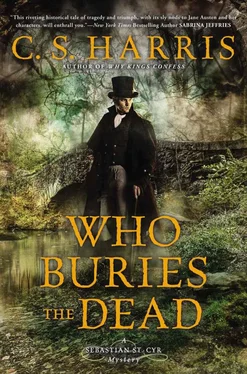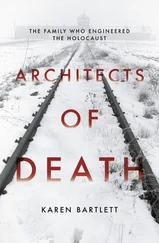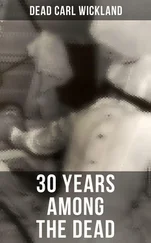C. Harris - Who Buries the Dead
Здесь есть возможность читать онлайн «C. Harris - Who Buries the Dead» весь текст электронной книги совершенно бесплатно (целиком полную версию без сокращений). В некоторых случаях можно слушать аудио, скачать через торрент в формате fb2 и присутствует краткое содержание. Год выпуска: 2015, Издательство: Penguin Publishing Group, Жанр: Исторический детектив, на английском языке. Описание произведения, (предисловие) а так же отзывы посетителей доступны на портале библиотеки ЛибКат.
- Название:Who Buries the Dead
- Автор:
- Издательство:Penguin Publishing Group
- Жанр:
- Год:2015
- ISBN:нет данных
- Рейтинг книги:4 / 5. Голосов: 1
-
Избранное:Добавить в избранное
- Отзывы:
-
Ваша оценка:
- 80
- 1
- 2
- 3
- 4
- 5
Who Buries the Dead: краткое содержание, описание и аннотация
Предлагаем к чтению аннотацию, описание, краткое содержание или предисловие (зависит от того, что написал сам автор книги «Who Buries the Dead»). Если вы не нашли необходимую информацию о книге — напишите в комментариях, мы постараемся отыскать её.
Who Buries the Dead — читать онлайн бесплатно полную книгу (весь текст) целиком
Ниже представлен текст книги, разбитый по страницам. Система сохранения места последней прочитанной страницы, позволяет с удобством читать онлайн бесплатно книгу «Who Buries the Dead», без необходимости каждый раз заново искать на чём Вы остановились. Поставьте закладку, и сможете в любой момент перейти на страницу, на которой закончили чтение.
Интервал:
Закладка:
A young woman and a good-looking boy of perhaps eight or ten were pushed up onto the block. Transfixed by fascination and horror, Sebastian could only watch as the auctioneer expressed a wish to sell mother and child together. But the woman had a withered right arm that discouraged buyers, whereas interest in her handsome son was strong. The auctioneer finally agreed to sell the two separately, and silent, helpless tears rolled down the woman’s cheeks as a spirited bidding began for the child.
Then the hammer fell, and the successful bidder-a fat man with bad teeth and an egg-stained waistcoat-pushed forward to collect his new property.
“No,” the mother screamed, lunging forward as the boy was led away. “No! You can’t take him. Oh, please don’t take him. Please. ”
Hands caught her, dragged her back. She fought wildly, uselessly, her face contorted with hopeless anguish. For one suspended moment, her frantic gaze met Sebastian’s over the heads of the onlookers, and he felt a wash of helpless shame-for his nation, his race, his time, and his own inaction-that he’d known even then would never leave him.
Now, as Sebastian drew his curricle up before the impressive home of Stanley Preston, he found himself remembering both Luge and that nameless, frantic mother. This graceful half-timbered Elizabethan manor might be half a world away from the cane fields and slave markets of the West Indies, but those cruelties had helped pay for it.
Most of Hans Town’s prosperous, up-and-coming residents were happy to occupy one of the newly constructed, identical brick terraces that lined Sloane Street and the new squares. But not Stanley Preston. He had chosen as his residence a grand relic of a bygone age. Known as Alford House, it stood in the well-tended remnants of what must originally have been a much larger garden, its brick walkways now gently sunken and mossy, its climbing roses twisted and knotty with the passage of the years. There were other such once grand houses in the area, but most had been turned into schools or hospitals, their noble owners having long ago fled to the likes of Berkeley Square or Mount Street.
Sebastian half expected to find the murdered man’s daughter, Anne, too prostrate with grief and shock to receive him. But she appeared after only a few moments, a slim figure in a simple black mourning gown, looking pale and shaken but admirably self-possessed.
She accepted his condolences and his apologies for disturbing her with a graciousness he couldn’t help but admire, and showed him into an elegant sixteenth-century drawing room with an elaborately molded plaster ceiling and dark paneled walls hung with a collection of old-fashioned dueling pistols and swords.
“Father loved this house,” she said, sinking onto a tapestry-covered settee near the room’s massive stone fireplace. “It’s old and drafty and frightfully unfashionable, but he didn’t care. It’s rumored Charles II actually hid here once during the Civil War, you know. There’s even supposed to be a secret passage somewhere, although Father never could find it.”
“Your father was interested in the Stuarts?” asked Sebastian, adjusting the tails of his morning coat as he settled in a nearby chair.
“He was interested in anyone famous-or infamous. In fact, the more infamous or tragic, the more interested Father was.”
She was more attractive than his aunt’s words had led him to expect, although undoubtedly shy, even nervous, in his presence. Her hair was the color of sun-warmed oak, cut short so that it curled softly around her face, her eyes wide set and deep and swollen from her tears. She said, “I keep thinking, if only Father had come with us last night to Lady Farningham’s musical evening, he’d still be alive.”
“Do you know why he chose not to attend?”
An unexpected smile lit up the depths of her mossy green eyes. “Father loathed musical evenings. He used to say that if he ended up in hell, the devil would torment him by forcing him to spend the rest of eternity listening to young ladies play harps.” Her smile faded, became something painful. “I had the impression he was planning a quiet evening at home. I can’t imagine what would have taken him to Bloody Bridge.”
“So it really is called that?”
“It is, yes. I’ve heard it’s a corruption of ‘Blandel Bridge,’ but its history is certainly bloody enough. Several people were killed there by footpads at the end of the last century, and it was the scene of repeated skirmishes during the Civil War. Father was always poking around there, finding rusty old spurs and bridle bits he said must have been lost in the fighting. But obviously he wouldn’t have been doing that at night.”
“I understand he was something of a collector.”
Again, that soft glow of remembered affection warmed her features. “I sometimes think Father would have been happiest as a wizened old eccentric charging the public a shilling to gawk at his cabinet of curiosities. He loved nothing more than showing off his collection. Mama always insisted he keep all but the most decorative items out of her drawing room, and he’s honored her memory by continuing to respect her wishes in that. But I’m afraid the rest of the house is overflowing with his various collections.”
“You say he was interested in relics of the Stuarts?”
“The Stuarts and the Tudors. They were his particular obsession. In fact, he has an entire gallery devoted to them.”
“May I see it?”
If she was surprised by the request, she was too well-bred to show it. “Yes, of course.”
She led the way to a long paneled room lined with glass cases filled with everything from daggers and maces to snuffboxes and opera glasses. Peering into the nearest case, he could see a dagger said to have belonged to James I, a carved and gilded angel from the reredos of a vanished monastery, and a faded silk pincushion with a neatly printed label that read GIVEN BY MARY, QUEEN OF SCOTS, TO HER LADY-IN-WAITING THE MORNING OF HER EXECUTION.
She said, “When Father was a boy, an aged cousin gave him a stirrup said to have been used by Richard III at Bosworth Field. He was so taken with the idea of possessing something that had once belonged to such an illustrious historical figure that it became his lifelong passion.”
Sebastian let his gaze drift along rows of cases, to where a blue velvet curtain hung at the far end of the room. He didn’t see any heads.
He said, “I’m told your father had certain relics of Oliver Cromwell.”
“Only this.” She moved to the end of the gallery to draw back the long fall of velvet. “He had the curtain installed after a dinner guest wandered in here by mistake, saw them, and fainted.”
The curtain opened to reveal three small glass and mahogany display cases mounted on pedestals. Each contained a severed human head resting in artfully arranged folds of the same blue velvet.
“That’s Cromwell,” she said, indicating the case on the right.
The head was unexpectedly small, as if it had shrunk as it dried, the flesh so darkened as to look almost black, the cheeks sunken, the eyes reduced to mere slits. Yet there was something about the slope of the forehead, the curve of the skull, that eerily echoed the paintings Sebastian had seen of the Lord Protector.
She said, “Most of the traitors’ heads that were displayed on pikes eventually rotted. But Cromwell died a natural death and was embalmed-it wasn’t until after the Restoration that his body was dragged from Westminster Abbey and hung in chains at Tyburn. Then the head was impaled along with those of two other regicides on spikes and mounted above Westminster.”
“Not London Bridge?”
“No. I suppose Westminster was chosen since it was the scene of their crime. The three heads were up there for decades, as a warning to anyone who might be tempted to imitate their deeds.”
Читать дальшеИнтервал:
Закладка:
Похожие книги на «Who Buries the Dead»
Представляем Вашему вниманию похожие книги на «Who Buries the Dead» списком для выбора. Мы отобрали схожую по названию и смыслу литературу в надежде предоставить читателям больше вариантов отыскать новые, интересные, ещё непрочитанные произведения.
Обсуждение, отзывы о книге «Who Buries the Dead» и просто собственные мнения читателей. Оставьте ваши комментарии, напишите, что Вы думаете о произведении, его смысле или главных героях. Укажите что конкретно понравилось, а что нет, и почему Вы так считаете.












